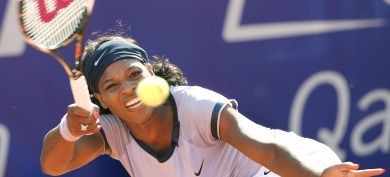The eight-times Grand Slam winner beat her Italian opponent 6-2, 6-3, coasting to victory in 1hr 11mins. Williams has never won in Berlin and this is her first appearance in the German capital since 2002 when she lost in the final to current world number
one Justine Henin.
The American is now likely to face 11th seed Agnieszka Radwanska from Poland for a place in the quarter-finals.
All three seeds involved in second round games made it through with no problems on Tuesday as seventh-seed Elena Dementieva from Russia saw off Ukrainian Kateryna Bondarenko with an untroubled 6-1, 6-2 win. And earlier in the day, French eighth-seed Marion Bartoli had few problems as she enjoyed a quick 6-0, 6-3 win over Lucie Safarova from the Czech Republic.
The only seed to bow out on Tuesday was Switzerland’s Patty Schnyder who was beaten by Vera Dushevina from Russia 6-2, 6-3 in the first round.
It had been a black Monday for French hopes in Berlin after former world number one Amelie Mauresmo withdrew with a rib injury brought on by a coughing fit. And Tatiana Golovin, ranked 21st in the world, suffered a first round defeat in only her second tournament back after a ten-week break in which she had surgery to remove a cyst that was causing back pain.
Mauresmo, who won the German Open in 2001 and 2004, pulled out of the tournament late on Monday because of pain in the muscles between her ribs.
“The pain started because of strong coughing fits and I have not been able to fix the injury since the EDF-Cup,” said the 28-year-old, who is now 19th in the world, on her website.
“Since my arrival in Berlin, I cannot compete properly, because of the pain. I need to be careful and it is better to withdraw from the tournament rather than to make the wound worse. I am very disappointed, but I hope to be able to play in Rome next week.”



 Please whitelist us to continue reading.
Please whitelist us to continue reading.